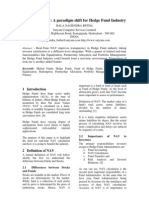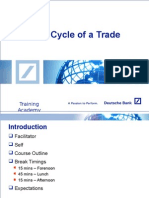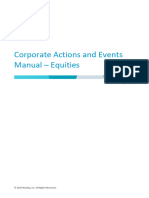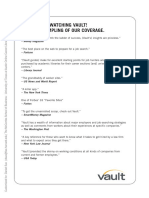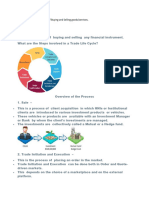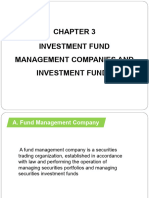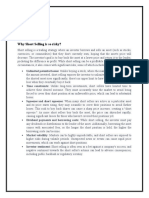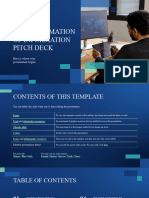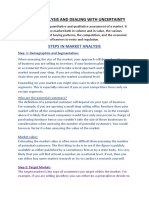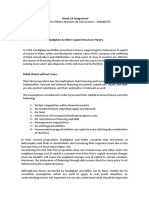SS&C GlobeOp Fund Accounting
Best Administrator Best Administrator Valuation Services 59 Best-in-Class Best North American Best Outsourcing No. 26 in the
Middle Office Services Managed Accounts Provider of the Awards Administrator Provider Top 100
Year
�Objective
At the end of this training session participants will be able to relate
their existing knowledge with practical realities of fund
accounting in Global Capital Markets.
2
�From the basics…
What is a fund ?
A sum of money saved or made available for a particular purpose
What is a Mutual fund ?
A fund operated by an investment company which raises money from shareholders
and invests in a group of assets, in accordance with a stated set of objective.
What is a Hedge fund ?
A hedge fund is an alternative investment vehicle available only to sophisticated
investors, such as institutions and individuals with significant assets.
3
�From the basics…
What is a Net Asset Value (NAV) ?
NAV is the value of an entity’s assets minus the value of its liabilities
Who is a Fund accountant ?
The one who values the fund and produces the final NAV of the entity.
4
�Fund accountants role
Recording
Analyzing
Reporting
5
�Scope of Fund Accounting
Trade/cash reconciliation & resolution of discrepancies
Analyze & deliver estimated daily pnl
NAV reporting
Financial statements preparation
Continuous process improvement
6
�Structure of Hedge Funds
Standalone Fund
INVESTORS
STAND ALONE
FUND
7
�Structure of Hedge Funds
Master-Feeder Structure
8
�Structure of Hedge Funds
Fund of Fund Structure
9
�Fund Accounting – Core Activities
10
�Daily Pnl Process
Over-the-
Trade
Static Data counter Trade
Upload
Booking
Trade Capture
Listed Products Security Valuations OTC
Reconciliation Pricing control Reconciliation
Pricing
Accounting Engine
Client Reporting
11
�Pnl Calculations – Common Terminologies
Realized price : The difference between the Cost price and the Selling price of the
Security for the squared off positions.
Unrealized price : reflects mark to market gain / loss incurred & is calculated by
comparing prices of current day’s closing price with that of prior day’s closing price.
Realized FX : The difference between the FX rate on the trade date and the date
on which the Security has been squared off.
Unrealized FX : reflects mark to market gain / loss incurred & is calculated by
comparing rates of current day’s closing currency exchange rates with that of prior
day’s close.
Realized income : reflects interest received in the case of Bonds or dividend
received in the case of Equity.
Unrealized income : reflects the accrued interest or dividend on the security.
12
�Corporate Actions
A corporate action is an event initiated by a public company that affects the
securities (equity or debt) issued by the company.
Types of Corporate actions:
Cash/Stock dividend
Stock-split
Return of capital
Acquisition
Merger
Right Issue
Spin-off
Buyback
13
�Month-end NAV Process
14
�Capital Activity
Subscription
Investor Feeder Fund
Redemption
Master Fund
Capital activity refer to any money movement to/from the investors into
the investing funds
Redemption from master to feeder for expenses also refers to redemption
for the master fund
15
�Non-trading/Trading accruals
Mercantile/accrual method:
Expenses and income are recognized based on the period they pertain to.
This gives rise to two concepts:
Accrued expenses: Expense is recognized for the period but not paid for
Prepaid expenses: Expenses incurred for a future period
Cash method:
Incomes and expenses are taken into account on actual receipt or payment.
Non-trading accruals
Amortizations/receivables on asset side of TB; payables on liability side of TB
Trading accruals
Current month accruals are supported by PB/Counterparty statements
16
�Perform/Review Reconciliation
Perform/Review reconciliation of each NAV component
All cash & positions balances in the portfolio must be supported by PB
statements
Difference, if any are properly explained & supported
17
�Pricing/Valuations
All securities priced as per fund governing documents
Pricing hierarchy and tolerances per product are followed
Escalation of any material valuation differences
All material price/market value breaches are properly explained/supported
18
�NAV Package
Purpose: To ensure that the NAV of the fund is accurate through the
reconciliation of client portfolio to the PB or 3rd party sources
Positions: Prove existence and completeness of all assets & liabilities
Valuations: Fair Value, independent backup, tolerance checks
Accounting Entries: Accounting for trade and non-trade accruals
19
�Investor Allocations
Purpose: To ensure that the NAV of a fund is allocated to the
investors in accordance with the governing documents
• Generates P&L on Master
the investments
Fund
• Management & Feeder
Performance fees charged
here Fund
• P&L finally
allocated to
investor
Investor
20
�What is allocation ?
Allocation is distribution of profit and loss to investors in Investment Ratio.
Fund Name ABC Fund
Investor Mr. X
Investment Amount 10,000,000
Investor Mr. Y
Investment Amount 40,000,000
When Invested 1/1/20XX
PnL earned by Fund Month 1 2,500,000 Profit and Loss
Share of Mr. X in PnL 500,000 Distribution of Profit and Loss
Share of Mr. Y in PnL 2,000,000 Distribution of Profit and Loss
NAV of fund 52,500,000
Investment Ratio 1:4 Also called as Starting Gross Ratio
21
�Allocation terminology
Management fees : An investment advisory fee charged by the investment
manager on the basis of fund's Assets. It could typically range from 1% to 4%
per annum, 2% being standard. Management fees could be in Arrears or in
Advance
High water mark : Increase in Net Asset Value of a fund over its benchmark
on which incentive fee is calculated
Incentive fees : Fee paid to investment managers based on fund’s
performance, typically ranging from 10% to 30% per annum, 20% being
standard.
22
�Allocation Methods
Onshore funds
Partnership accounting
Offshore funds
Series accounting
Equalization accounting
23
�Partnership Accounting
Under partnership accounting investors are treated as partner of the fund.
Generally no share are issued to Partner
If an investor invests five different times into the fund, each investment
would be viewed separately in relation to the HWM or one cumulative HWM.
31-Mar 30-Apr
Capital
Account
Investor A Code HWM Gross Net Gross Net
January Subscription 1 1,000,000 1,001,000 1,000,800 1,000,500 1,000,400
February Subscription 2 500,000 500,500 500,400 499,900 499,900
March Subscription 3 2,000,000 2,002,000 2,001,600 2,003,000 2,002,400
Total 3,500,000 3,503,500 3,502,800 3,503,400 3,502,700
31-Mar 30-Apr
Capital
Account
Investor A Code HWM Gross Net Gross Net
Total 1 3,500,000 3,503,500 3,502,800 3,503,400 3,502,720
24
�Series Accounting
A new Series of Shares is issued for each new subscription period
Price per share at issue can be fixed - i.e. 100 / 1000
Ensures performance fees are calculated based on timing of subscription into the
fund
Each series has unique HWM for calculation of fees and unique NAV
Optional roll/consolidation of series at end of performance fee calculation period
25
�Series Accounting
Jan 20XX Feb 20XX
Subscription Amount 20,000,000 30,000,000
Issue price of Share 100 100
Will be placed in which series Jan 20XX Series Feb 20XX Series
High Water mark per share 100 100
All investors coming in month of Jan All investors coming in month of Feb
will be placed in Jan 20XX series and will be placed in Feb 20XX series and
this series will have same Gross NAV this series will have same Gross NAV
and HWM per share and HWM per share
End of Jan (on assumption fund made End of Feb (on assumption fund
profit) made loss)
NAV per share for Jan series 110 NAV per share for Jan series 108
HWM per share for Jan series 100 HWM per share for Jan series 100
NAV per share for Feb series 98
HWM per share for Jan series 100
26
�Equalization Accounting
Class Structure only – no series created based on timing into fund
Each new subscription period the investors come in at the closing GNAV of class
they are subscribing into
Upon subscriptions equalisation credits or a contingent liability is established
based on the class performance since last crystallization period
At close of performance calculation period - i.e. fund closes above starting HWM
Initial investors – performance fee is paid to IM
Investors subscribed above HWM – equalisation credits payable to investors
are converted to shares in investors account
Investors subscribed below HWM – fees due on basis of investor HWM and fund
starting HWM are processed as a mandatory redemption of shares to cover the
liability
27
�Equalization Accounting
Above Class HWM Below Class HWM
Subscription Amount 20,000,000 30,000,000
Issue price of Share here it 110 98
will be Gross NAV of class
Class HWM 100 100
Scenario Here there will be Equalization Credit Here there will be Contingent
of 10 per Share redemption of 2 per Share
Equalization is paid to the investor by Contingent redemptions are paid to
cash/additional shares the Investment manager as
Performance fees by redeeming
shares
28
�Series Vs. Equalization Accounting
SERIES EQUALIZATION
New Series created on each dealing date. New share classes not created for each subscription
Shares issued at 100 or existing NAV (as per PPM) Shares issued at prior period Gross NAV
Performance Fee is based on each investor’s HWM Performance Fee is based on Class HWM
Multiple NAV’s to be published on NAV dates Each class will have the only one NAV per share
Investors in the same class can have different NAV’s, if Investors in the same share class will have the same
subscribed at different points in time NAV per share irrespective of point of entry
Series roll-over to be performed periodically to HWM’s to be reset at end of crystallization period
consolidate profit making series
Operationally difficult to manage multiple series Number of share classes will be limited
29
�Introduction and Scope of Financial Statements
What is the Financial Statements (FS)?
Qualitative & Quantitative information of the fund
Indicates financial health/performance of the fund
Compiled on a Quarterly, Half-yearly and Annual basis
Why clients need to prepare FS?
Statutory/Legal requirements to prepare FS
Auditors independent view
Various reporting standards used in preparation of FS:
United States Generally Accepted Accounting Principles (US GAAP)
International Financial Reporting Standards (IFRS)
UK GAAP, Irish GAAP etc.
30
�Various Schedules of FS
Statement of Financial Position / Asset and Liabilities
A statement of assets, liabilities and equity on a particular date
Statement of Comprehensive Income / Operations
Summary of revenues and expenses over a period of time
Statement of Changes in Net Assets
Changes in net assets/capital of a fund – from beginning of the FS period till the end
Changes (Increase/decrease) on account of PNL from operations
Changes on account for capital activities (Subscription/Redemption)
Statement of Cash Flows
It is a statement that shows the changes in the cash balance, sources and utilizations of
cash in the operating, investing and financing activities
31
�Key Differences Between IFRS and US GAAP
Financial Statements
IFRS US GAAP
Principal based Standards Industry specific standards
Comparatives mandatory Comparatives not mandatory
Statement of cash flow mandatory Statement of cash flow not
mandatory subject to some
liquidity requirements
Schedule of investments is optional Schedule of investments is
mandatory
No financial highlights required Financial highlights mandatory
32
�Other Deliverables
Audit
Ad hoc Regulatory
Support Client Reporting
Reporting
33
�Important Notice
Notice: This document is provided for informational purposes only, and the contents hereof are subject to change without notice or
update. This presentation is not an offer or a contract. No contractual obligations, representations or warranties are formed either
directly or indirectly by SS&C GlobeOp in providing this information, nor is it intended for this information to take the place of your and
your organization’s own independent due diligence and investigation. SS&C GlobeOp has a variety of available services; in the event that
SS&C GlobeOp is or has been chosen to provide certain services, those services shall be specifically described in and subject exclusively
to a services agreement between SS&C GlobeOp and your organization. The pricing, service and technical information contained herein
is proprietary to SS&C GlobeOp and is SS&C GlobeOp's confidential information. Any use or distribution of this information other than
internally within your organization on a need-to-know basis is strictly prohibited.
34










